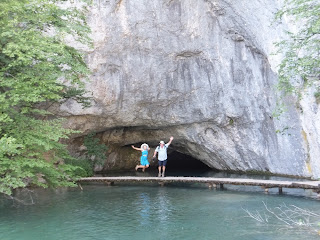
Plitvicka Jezra National Park is the oldest national park in Croatia and was proclaimed a UNESCO World Heritage Site in 1979, The park is pretty impressive. It is covered in a lush old forest of beech and fir and has a series of lakes running through it. These lakes are formed by a build up of tavertine barriers in the ancient river. Tavertine, as we learnt at the Krka National Park, forms when particles of calcium are precipitated out of water and are trapped in biological growth such as algae and mosses where it forms hard barriers.
 |
| The classic view of Plitvicka. |
 |
| The travertine waterfalls start as small cascades which get covered in vegetation which traps the precipitate which forms travertine. |
 |
| Everything underwater gets coated in travertine and doesn't decompose. |
 |
| Any part of the fallen trees that aren't submerged in the water quickly start decomposing and are colonised with vegetation. |
The main difference between Krka and Plitvicka is the large scale of Plitvicka which includes 16 large lakes and the tranquilness of an extensive old forest. We loved walking the board walks along the lakes and waterfalls, and on the kilometres of trails through the forests.
 |
| The highest lake is one of the largest in the park. |
 |
| Around some of the lakes are lovely meadows full of flowers. |
 |
| A waterfall peeping out of the forest. |
 |
| Lovely and tranquil scenery. |
 |
| We loved the low cascade waterfalls best. |
 |
| It was great to explore the lakes with Neville and Diny. |
As with many of the national parks that we went to, your entrance fee includes transport within the park, so it is worth making a full day or two of it as you can explore a lot of the park with their bus services that run between the two entrances and the highest lake and the ferry services that run across some of the lakes. We also found it easiest to explore from early in the morning while it was still relatively cool, nap under a shady tree over midday and then explore again in the afternoon and evening.
 |
| Geoff in his favourite place. |
 |
| Happy Geoff. |
 |
| One of the amazing things about travertine waterfalls is that the travertine is being built all the time and so the waterfall moves outwards leaving overhangs and caves behind the falling water. |
 |
| We wanted a jumping photo of this waterfall. The problem was that we were on a rickety wooden walkway only 1,5m wide and involved Lucy lying on the over hanging edge trying to fit Geoff's frame and the waterfall onto the screen. |
 |
| The rickety wooden walkways. |
 |
| The forest in this part of the country is really lovely. |
 |
| The largest waterfall is supposedly 70m high. |
The park supports a fair amount of wildlife. The lakes are full of every sized trout that you could imaging (from a couple of species), and we enjoyed seeing ducks, herons, forest frogs, both land and water snakes and a freshwater lobster. We were not lucky enough to see the bears or wolves or any of the raptors for which the park is known.
 |
| The overhanging branches make lovely walkways along the clear turquoise water. |
 |
| We were impressed with the good quality of the paths and the interesting water that they provided. |
 |
| The colour of the water was just surreal. |
 |
| Looking across to one of the bigger cascades. |
 |
| One of the walks we did took us away from the lakes and through some of the most beautiful forest that we'd walked in. |
 |
| Looking down on some of the lakes from above. Each lake is separated by a collection of waterfalls. |
Apart from the Travertine and Limestone that forms most of waterfalls, there is also a considerable amount of Dolomite. There were some interesting caves that we explored (and many more that we didn't) that were formed from one or more of the above rock types. We really enjoyed this added dimension to our trip.
|
One of the caves formed in the Limestone. (Neville and Diny)
|
|
|
Looking up a 'sinkhole' or doline from near the water level.
|
 |
| We couldn't get enough of the beautiful blue water. |
 |
| Plitvicka - what a lovely place to play. |
 |
| Tired after a long walk. |
 |
| And of course there are stunning evenings. |


































No comments:
Post a Comment